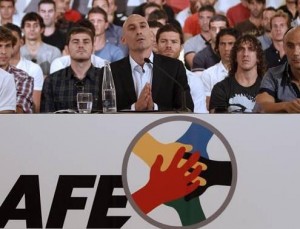
There remains a very real danger that the Spanish football season will not kick off as planned this weekend. Last Thursday, the Spanish players’ union announced that its members were downing boots for the first two games of the new season, unless the Spanish league leans on clubs to pay back-wages owed to many players at La Liga’s top clubs.
The football players’ association (AFE) president Luis Rubiales told a press conference that 200 first and second division Spanish league players are owed wages, some going back a number of years, totalling over €50 million. He called for the Spanish football league (LFP) to put in place a larger emergency fund to help players not being paid by their employers who are in financial administration.
The seriousness of the threat was shown by the calibre of players lined up in the row just behind Rubiales as he spoke. Stern expressions on the faces of Spanish internationals Santi Cazorla, Fernando Llorente, Iker Casillas, Xabi Alonso and Carles Puyol showed just how important this issue was to them. Around 100 of their fellow footballers were also present, as were player union representatives from France, Germany and Italy.
This show of determination was important as there is an inevitable “cry wolf” reaction to the calling of a strike by Spanish footballers. In recent years a number of strikes have been threatened but averted. But there does seem to be a feeling that this time might be different. It is hard to fault the comments from Rubiales, a former Guadix, Xerez, Levante and Hamilton Academicals midfielder, who became AFE head in March 2010.
“We don’t want more money, we want the clubs to honour the contracts they sign with their players,” he said. “We have put forward proposals which exist in Holland, Germany, France and England which are preventative. In these countries if a club shows it can’t pay its players the club doesn’t compete. We have asked that players who are owed more than three months’ [wages] can break their contracts. It seemed like we had an agreement but it was left out.”
Some kind of “preventative” measures do appear to be needed to tackle financial maladministration in Spanish football, where the 20 top division clubs have a total combined debt of over €3 billion. Since 2004, 23 first and second division Spanish clubs have taken refuge in the Spanish “Ley Concursal” which allows them to default on some or all of their debts. Twelve clubs from the top two divisions are currently in the process of doing this. The players are just the most visible (and some might argue least deserving) of the many creditors suffering from the situation.
Some clubs blame this on the current troubled state of the general Spanish economy. Commercial revenues have fallen recently, with Atlético Madrid, Valencia, Villarreal and Sevilla all yet to find a shirt sponsor for the coming season. The traditional outlet for Spanish clubs in financial trouble – doing a deal with fans or friends at local banks, government or business – is now less likely to work for obvious reasons. The arrival of foreign owners with money has worked better at some clubs than others, but is hardly a sustainable solution for everyone.
So some kind of structural change seems to be required. A pretty obvious move by clubs which are constantly losing money would be for them to stop continually increasing the amount of money they pay (or at least agree to pay) to their players. Even Barcelona, with the key players in their phenomenally successful team having come through their much lauded La Masia youth system, have an annual player-wage bill which reportedly stands at about €230 million. Many other clubs without Barcelona’s revenue-generating muscle operate outside their means.
The LFP has suggested that clubs cap annual spending on player wages and transfers at 70 per cent of their total income. UEFA’s Financial Fair Play regulations should also incentivise presidents and managers to make better financial decisions. The clubs prefer to hope that a new TV rights deal might spread revenues more fairly around the league and allow them to operate on a sounder basis. The current agreement, under which Madrid and Barcelona share half of the approximately €600 million available, does seem unfair, but a more equitable deal would not necessarily lead to less indebted clubs. Without stricter regulation it is very possible that presidents and managers would continue to overspend, just on a larger scale than ever.
In the shorter-term (i.e before the league is supposed to kick off next Saturday afternoon), it seems likely that some kind of support from the LFP for Rubiales’ argument that a threat of severe punishment is required to make sure that clubs fulfill their contractual obligations to their employees will be required. A meeting between the players and the league has been scheduled for Wednesday morning to discuss how the strike might be averted. The clubs won’t like it, and the league might not like appearing to come down on the side of mostly very well-paid players, but as Racing Santander’s president Francisco Pernía pointed out, something needs to be done “for the good of football”.
Leave a Reply
You must be logged in to post a comment.